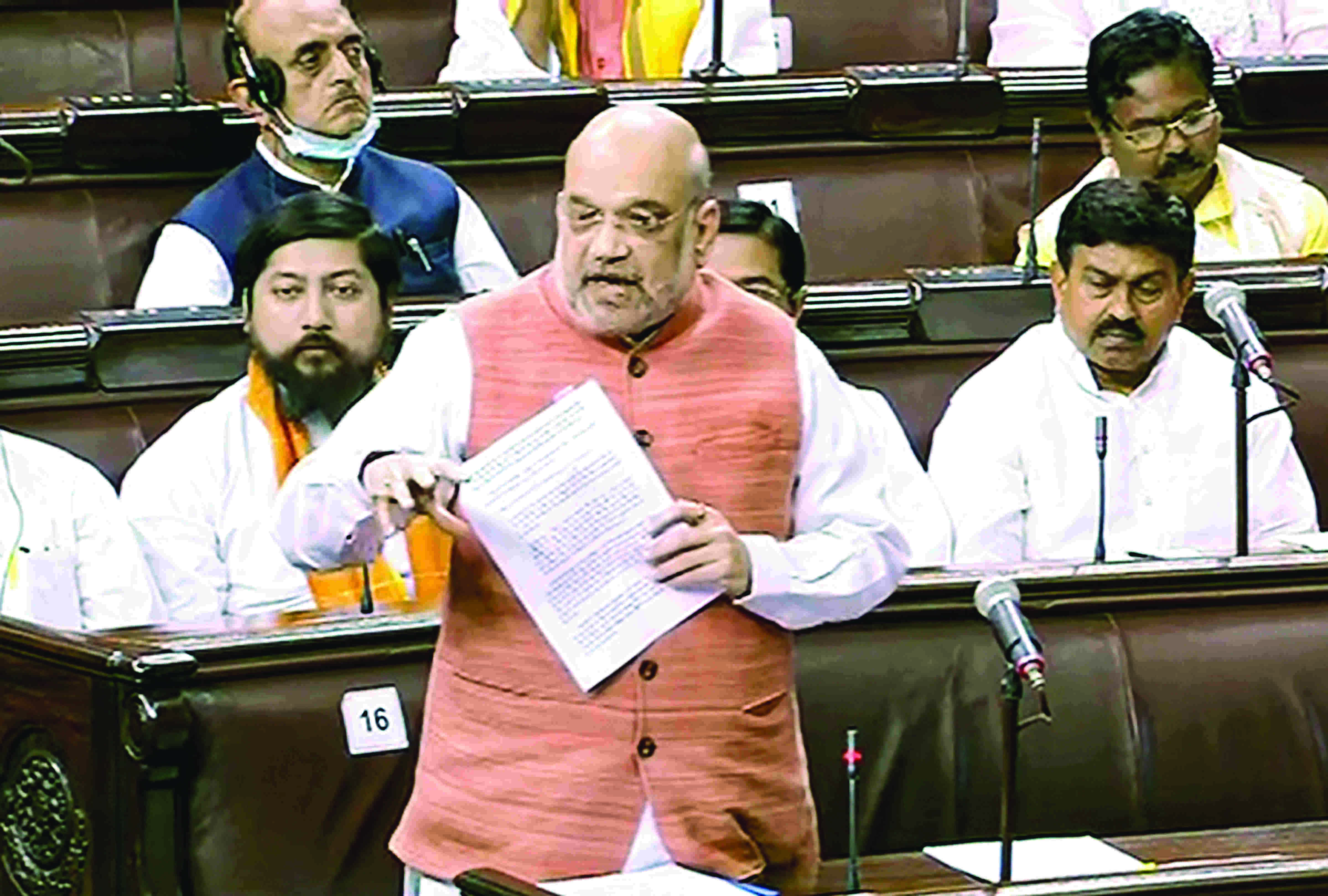Parl passes Criminal Procedure Bill

New Delhi: Parliament on Wednesday passed the Criminal Procedure (Identification) Bill, with Home Minister Amit Shah assuring the Rajya Sabha that biometric data of political detainees will not be collected and the proposed law will exclude brain mapping and polygraph test from its ambit.
The bill was passed by a voice vote after Shah sought to allay concerns raised by the Opposition, which claimed the draft law was "draconian".
The Lok Sabha had passed the Criminal Procedure (Identification) Bill, 2022, which replaces the Identification of Prisoners Act, 1920, on Monday. The legislation will now be forwarded to the President for approval before it becomes law.
"Under section 3, the government of India has the right to make rules. We will define it and ensure that no person involved in a political agitation has to give (physical and biometric) measurements only for political agitation. But, if a political leader is arrested in a criminal case, then he will have to be at par with a citizen," Shah said.
He said no measurements will be taken of any political person for violation of prohibitory orders promulgated by police.
While replying to a debate on the bill, Shah underlined the legislation is aimed at improving the conviction rate.
"It is aimed at building capacity for the police and forensic teams," he said, adding the measure was intended to preclude the use of third degree methods (custodial torture) and making available the benefits of science and technology to prosecuting agencies.
Shah deplored none of the members rose to say conviction rates in the country are low and should be increased.
According to the minister, 66 out of 100 people charged with murder and 70 of 100 arraigned for dacoity get acquitted.
Shah said the bill has been brought to ensure that police and investigators remain two steps ahead of criminals.
"I want to assure you that this is not going to violate the privacy of anyone," Shah said, seeking to assuage the concerns of opposition MPs.
The data collected will be completely secure, he said.
"No provision of this bill permits performing narco analysis, polygraph test and brain mapping of any prisoner," the home minister said.
Shah said police will send fingerprint impressions to the National Crime Records Bureau (NCRB), which will share the name of the person with the investigators only if it matches with the records present in the database. Police will not have access to fingerprint data of others, he said.
"We will notify it after making a complete system. We will have to understand next generation crime and break their cycle as well. We want police, law enforcement agencies to be two steps ahead of criminals. This effort is to empower police," he said.
Shah said the government intends to amend the Indian Penal Code, Criminal Procedure Code and Evidence Act, and has invited suggestions from public.
He said the government has created the Crime and Criminal Tracking Network & Systems (CCTNS), which has been adopted by 100 per cent police stations across the country.
The home minister asserted he had no apprehensions about the proposed law being abused.
"There has been misuse. We have fought and come out of it," Shah said.
Several opposition parties slammed the bill as "unconstitutional" and "draconian" and claimed it could be misused.
Taking part in the discussion on the Criminal Procedure (Identification) Bill, 2022, which was moved in Rajya Sabha by Home Minister Amit Shah, Congress leader P Chidambaram and other opposition members favoured sending the bill to a select committee for further deliberations, but the demand was rejected.
Chidambaram claimed during the debate that the provisions in the bill can be misused as the police can arrest and take fingerprints and DNA samples of even those who are taking part in political rallies.
"Is there anyone in this House who has not violated a law? I ask the honourable home minister who has had an active political career, have you never violated any law?...even if you are convicted of an offence where the punishment is Rs 100, this law applies," Chidambaram said.
The former union home minister claimed that the worst sufferers will be the "oppressed and the poor".
"This bill is unconstitutional. This is illegal. We are deceiving ourselves if we are passing a bill. This bill has a huge net, which can embrace anyone in this country. And you know what happens when a law of this (kind) is applied, the worst sufferers will be the disadvantaged, oppressed and the poor," he said.
Sukhendu Sekhar Roy (TMC) opposed the bill terming it draconian and said that the government wants to use its brute majority to pass the bill.
Asserting that the legislation violates the principle of natural justice, he called for sending it to a select committee.
Similarly, Tiruchi Siva of DMK opposed the bill and asked the government to send it to the select committee for removing anomalies. He said that the bill should be exhaustively discussed before its passage.
He alleged that the government wants to armour itself with draconian laws which can be used even against political and social activists.
Sujeet Kumar (BJD) said the bill would not be able to withstand judicial scrutiny.
Ram Gopal Yadav (SP) opposed the bill and noted that it would be challenged in the Supreme Court even if it is passed in Parliament.
He said that the bill should be sent to a select committee
Similarly, AD Singh of RJD also opposed the bill.
V Vijaysai Reddy (YSRCP) on the other hand supported the bill saying it would help in improving the conviction rate in the country. He also accused the Congress of foisting false cases against party leaders.
A Navaneethakrishnan (AIADMK) came out in support of the legislation, saying it is the right intervention.
He asserted that the legislation did not violate constitutional provisions. Ram Nath Thakur (JD-U) also supported the bill.



